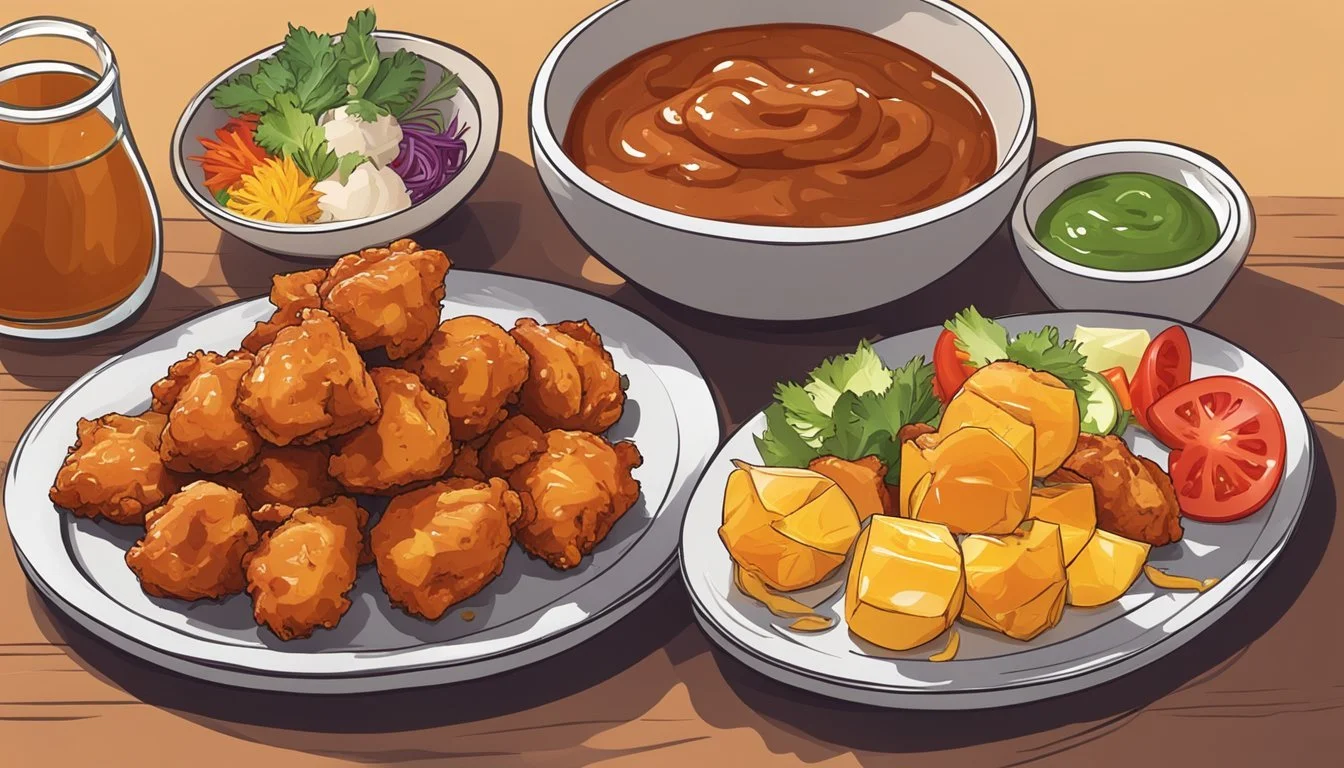How Long Do BBQ Chicken Bites Last?
Storage Tips and Shelf Life
Barbecue chicken bites are a crowd-pleasing favorite at any gathering, blending savory and sweet flavors in bite-sized portions. The delight of these tender morsels, however, extends beyond the initial feast. Properly stored, BBQ chicken bites can last up to four days in the refrigerator, making them a convenient option for meal prep or leftovers.
When stored in an airtight container, these chicken bites retain their flavor and moisture, ensuring they remain just as tasty as when freshly cooked. For those looking to extend their shelf life even further, freezing is an excellent option. BBQ chicken bites can be frozen for up to three months, allowing for quick and easy meals in the future.
Ensuring food safety is paramount when handling leftovers. Always check the chicken bites for any signs of spoilage before consuming, and reheat them to an internal temperature of 165°F to guarantee safety. By following these guidelines, you can enjoy your BBQ chicken bites well beyond the first bite.
Essential BBQ Chicken Bites Information
BBQ chicken bites are a popular and tasty option for both appetizers and main courses. Key topics include their general characteristics and the ingredients that drive their flavor profile.
Understanding BBQ Chicken Bites
BBQ chicken bites are typically made from boneless, skinless chicken breasts or thighs, cut into small, bite-sized pieces. These pieces are often marinated or seasoned to enhance flavor before cooking. They are popular due to their versatility and ease of preparation.
Nutrition is a key consideration for many. BBQ chicken bites primarily offer a good source of protein. Depending on the marinade and preparation method, they can also contain varying levels of fats, sugars, and sodium. Opting for homemade recipes can help control these nutritional components.
Key Ingredients for Flavor
Several ingredients are essential to ensure that BBQ chicken bites are flavorful. Marinades often include a mixture of BBQ sauce, spices, and sometimes a sweet component like brown sugar or honey to enhance the taste.
Common spices and seasonings used are garlic powder, paprika, salt, and pepper. Some recipes call for adding a bit of heat with ingredients like Sriracha or chili powder.
The use of oils, such as olive oil, helps in cooking the chicken evenly and keeping it moist. Grilling or baking at 400°F is a standard practice to achieve a well-cooked and delicious bite.
To ensure rich flavor, it's crucial to follow the recipe closely and allow ample time for the chicken to absorb the marinade before cooking.
Preparation Guidelines
The proper preparation of BBQ chicken bites involves gathering the necessary ingredients and following specific cooking steps for optimal results.
Required Ingredients
Before starting, assemble the following ingredients:
Chicken: Use boneless, skinless chicken breasts or thighs, cut into bite-sized pieces
Seasonings: Include paprika, garlic powder, salt, and pepper for basic seasoning
Flour: All-purpose flour for coating
Egg mixture: Eggs and milk, whisked together
Olive oil: For cooking
BBQ sauce: Choose your preferred barbecue sauce for flavor
Extras: Chopped parsley for garnish (optional)
Having all ingredients ready will streamline the cooking process.
Step-by-Step Instructions
1. Preheat the Oven: Set oven to 400°F (200°C) to ensure it reaches the required temperature.
2. Season the Chicken: In a bowl, season chicken pieces with paprika, garlic powder, salt, and pepper. Toss to coat evenly.
3. Prepare the Coatings:
In one bowl, place all-purpose flour.
In another, whisk together eggs and milk.
4. Coat the Chicken: Dredge each chicken piece in flour, dip in egg mixture, then coat again with flour.
5. Oven Preparation: Line a baking sheet with parchment paper or a silicone baking mat.
6. Cook: Arrange chicken on the prepared baking sheet and bake for 20-25 minutes, turning halfway, until golden and cooked through.
7. Add Sauce: Heat a large skillet with olive oil. Add baked chicken, pour in BBQ sauce, and cook for an additional 5 minutes to caramelize.
Carefully follow these steps to achieve flavorful and well-cooked BBQ chicken bites.
Cooking Techniques
Different methods can be used to cook BBQ chicken bites, each offering unique benefits and flavor profiles. Key techniques include oven baking and grilling alternatives, each providing a simple and effective way to achieve delicious results.
Oven Baking Methods
Oven baking is a straightforward and convenient method. Preheating the oven to 400 degrees Fahrenheit (200 degrees Celsius) ensures even cooking. A baking sheet lined with parchment paper or a silicone baking mat can prevent sticking.
Seasoning the chicken bites with spices like paprika, garlic powder, salt, and pepper enhances flavor. Breading techniques often involve coating the seasoned chicken in flour, then dipping it into a mixture of whisked eggs and milk.
The bites are then baked in the oven until they reach an internal temperature of 165 degrees Fahrenheit (75 degrees Celsius). Using a meat thermometer can ensure accuracy and safety. This method produces a crispy exterior while keeping the inside moist.
Grilling Alternatives
Grilling offers a smoky flavor that many find appealing. It's important to preheat the grill to medium-high heat. Before grilling, marinate the chicken bites to infuse them with added flavors. Popular marinades include combinations of barbecue sauces, pineapple juice, and spices.
To prevent sticking, lightly oil the grill grates. Place the chicken bites on the grill, turning occasionally to ensure even cooking. Grill the bites until they achieve a charred exterior and an internal temperature of 165 degrees Fahrenheit.
Using bacon wraps or skewers can add variety. Grilling typically takes less time than baking, making it a quicker option for those looking to save on cook time.
BBQ Sauce Selection and Usage
Choosing the right BBQ sauce is crucial for ensuring the best flavor for BBQ chicken bites. Depending on the ingredients and flavors, different BBQ sauces can significantly alter the taste and texture of the dish.
Homemade vs. Store-Bought
When selecting BBQ sauce, deciding between homemade and store-bought options is significant. Homemade sauces allow for customization. For instance, you can add garlic powder, honey, or other seasonings to achieve the exact flavor profile desired.
Advantages of homemade BBQ sauce:
Customizable ingredients and flavors.
No preservatives.
Fresh taste.
Store-bought sauces, on the other hand, are convenient and often come in a variety of flavors such as honey BBQ sauce or chipotle. They are ideal for those who prefer a quick option without compromising too much on flavor.
Advantages of store-bought BBQ sauce:
Time-saving and convenient.
Consistent taste and quality.
Wide variety of flavors and brands available.
Flavor Enhancers
Enhancing the flavor of BBQ chicken bites can elevate the overall experience. Common flavor enhancers include garlic powder and honey, which are often added to both homemade and store-bought BBQ sauces.
Garlic powder provides a robust and savory undertone that complements the sweetness of many BBQ sauces. Honey adds a natural sweetener that enhances caramelization during cooking, resulting in a richer flavor and glossy finish.
Other enhancers like smoked paprika or chili powder can introduce complex and spicy notes, offering a unique twist to traditional BBQ flavors. Experimenting with various combinations can lead to the perfect balance between sweetness, spice, and savory notes in BBQ chicken bites.
Serving Suggestions
BBQ chicken bites can be served as an appetizer or main dish. They can be presented aesthetically and complemented with various sides to enhance the dining experience.
Presentation Tips
To make BBQ chicken bites visually appealing, use a serving platter that contrasts with the color of the chicken. White or brightly colored platters work well. Arrange the bites in neat rows or circles.
Inserting toothpicks in each bite makes them easy to pick up and enjoy, especially in a party setting.
Garnish with finely chopped parsley or chives for a touch of color. Drizzle some extra BBQ sauce over the bites just before serving for added flavor and visual appeal. If serving as an appetizer, keep dipping sauces nearby in small bowls for easy access.
Accompaniments
BBQ chicken bites pair well with various side dishes. For a balanced meal, consider serving with a fresh green salad. A Caesar or garden salad adds a refreshing contrast to the savory chicken.
For a more substantial meal, offer main dish options like coleslaw, potato salad, or mac and cheese. These sides complement the BBQ flavors and are crowd-pleasers.
Consider providing several dipping sauces such as ranch, blue cheese, or honey mustard. Offering a variety enhances the experience and allows guests to tailor their bites to their tastes.
Servings can be adjusted easily; estimate about 4-5 bites per person if serving as an appetizer, and more if they are the focal point of the meal.
Storage and Shelf Life
BBQ chicken bites can be a flavorful addition to any meal, but ensuring their proper storage is key to maintaining their quality and safety. Below are crucial guidelines for refrigerating and freezing these tasty bites.
Refrigeration
Refrigerating BBQ chicken bites is a simple way to store them for short-term use. Leftovers should be placed in airtight containers to minimize exposure to air and bacteria. They can last in the fridge for about 3-4 days.
For optimal safety, the chicken bites should be cooled and refrigerated within two hours of cooking. Ensure the refrigerator is set to 40°F (4°C) or lower. Check for spoilage signs like an unusual odor, slimy texture, or discoloration before consuming.
Freezing Guidelines
For longer storage, freezing BBQ chicken bites is an excellent option. When frozen properly, they can last up to three months. Wrap the chicken tightly using heavy-duty aluminum foil, vacuum-sealed bags, or other freezer-safe containers.
Clearly label and date the packages for easy identification. When ready to eat, thaw the chicken bites in the refrigerator overnight. Reheat them to an internal temperature of 165°F (74°C) to ensure they are safe to consume.
By following these guidelines, you can enjoy the nutritional benefits of your BBQ chicken bites while keeping them fresh and safe for future meals.
Safety and Quality Checks
Ensuring the safety and quality of BBQ chicken bites involves proper cooking temperatures and correct handling and storage practices. This will help avoid foodborne illnesses and maintain the best flavor and texture.
Proper Cooking Temperatures
To ensure BBQ chicken bites are safe to eat, they should be cooked to an internal temperature of 165°F (74°C). Using a meat thermometer can help achieve this precise temperature. Insert the thermometer into the thickest part of the chicken bite without touching the bone, if present.
Cooking the chicken thoroughly kills harmful bacteria like Salmonella and Campylobacter. Avoid relying solely on visual cues, such as color or texture, as these can be misleading. Always verify with a thermometer for safety.
Handling and Storage Practices
Once cooked, BBQ chicken bites should be stored promptly. Keep them at or below 40°F (4°C) for refrigeration. If left at room temperature, they should not sit out for more than 2 hours, or just 1 hour if the ambient temperature exceeds 90°F (32°C).
Use airtight containers to store the chicken in the fridge, which helps maintain its flavor and prevent contamination. When reheating, ensure the chicken reaches an internal temperature of 165°F (74°C) to kill any potential bacteria.
By adhering to these safety and quality checks, the BBQ chicken bites will remain safe and delicious for consumption.
Nutritional Insights
BBQ chicken bites are a popular dish that offers a range of nutritional benefits and considerations. This section provides detailed insights into the calorie content and dietary factors important for making informed choices.
Calorie Count
BBQ chicken bites typically offer a moderate calorie count, making them a reasonable option for a meal or snack. A serving of honey BBQ flavored boneless chicken bites generally contains around 150-200 calories. This includes calories from the chicken, breading, and BBQ sauce.
Here's a basic breakdown of the calories:
Chicken breast chunk (boneless, skinless): About 110-120 calories per 3 oz.
BBQ sauce: Adds around 40-60 calories.
Breading and additional ingredients: Contribute approximately 20-30 calories.
These numbers can vary based on portion size and specific preparation methods, so it's important to check detailed nutrition information.
Dietary Considerations
BBQ chicken bites cater to a variety of dietary needs but come with certain considerations. Each serving contains 17g of carbohydrates, 12g of protein, and 7g of sugars. These bites generally have 1g of dietary fiber, contributing to a balanced macronutrient profile.
For those monitoring their salt intake, be aware that BBQ chicken bites may contain significant sodium levels due to the use of sauces and seasoning. It's also worth noting potential allergens like wheat flour in the breading and corn syrup solids in the BBQ sauce.
Common ingredients include:
Brown sugar
Honey
Tomato paste
Vinegar
These ingredients can affect people with specific dietary restrictions like gluten intolerance or sugar-sensitive diets. Always check the specific nutrition label for the most accurate information.
Recipe Variations
When making BBQ chicken bites, you can try different seasonings and cooking methods to add variety to your meals. This allows you to cater to different taste preferences and experiment with exciting flavors.
Alternative Seasonings
There are numerous seasoning combinations to try when making BBQ chicken bites. Instead of sticking to the classic salt and pepper, consider mixing in paprika, garlic powder, or onion powder for enhanced flavor. For a hint of heat, add cayenne pepper or black pepper.
A mix of brown sugar and paprika can create a sweet yet smoky taste. If you prefer a tangier flavor, incorporate a bit of lemon zest or vinegar to the marinade. Fresh or dried parsley can add a burst of freshness and color.
Experiment with bacon-wrapped chicken bites to add a savory and crispy element. This not only adds richness but also pairs exceptionally well with the sweetness of BBQ sauce.
Different Cooking Methods
BBQ chicken bites can be cooked in various ways, each offering a distinct texture and flavor. Baking is a popular option. Preheat the oven to 400 degrees F, line a baking sheet with parchment paper, and bake the seasoned chicken until it reaches an internal temperature of 165˚F.
For crispy chicken bites, try frying. Heat a skillet with oil, and cook the chicken pieces on medium heat until they are golden brown and cooked through. This method gives the bites a crunchy exterior.
Grilling is another excellent method. It imbues the chicken with a smoky flavor. Preheat the grill, oil the grates to prevent sticking, and cook the chicken bites over medium heat until they are thoroughly done. Grilling often gives the bites an appealing charred finish that pairs well with BBQ sauce.
Troubleshooting Common Issues
BBQ chicken bites can sometimes turn out dry or lack the desired flavor. This section addresses these issues with specific solutions.
Dry or Overcooked Chicken
Dry or overcooked chicken can result from cooking at too high a temperature or for too long. To ensure tender and juicy chicken bites:
Monitor Cooking Time and Temperature: Bake chicken at 400°F for 20-25 minutes, turning halfway through. Use a meat thermometer to ensure an internal temperature of 165°F.
Marinate the Chicken: Allow the chicken to marinate for at least 30 minutes to retain moisture. Ingredients like honey, BBQ sauce, and olive oil help keep the meat tender.
Add Moisture Post-Cooking: If the chicken seems dry after cooking, mix it with additional sauce or butter to reintroduce moisture.
Lack of Flavor
Achieving flavorful BBQ chicken bites requires proper seasoning and cooking techniques. Here are some tips:
Seasoning: Use a mix of spices like smoked paprika, garlic powder, onion powder, and salt to enhance flavor. Ensure even coating of the chicken bites with the seasoning.
Marinating: A well-balanced marinade deeply infuses the chicken with flavor. Combine ingredients like honey, BBQ sauce, and spices, and let the chicken rest in it for at least 30 minutes.
Searing for Flavor: Begin by searing the chicken in a hot pan with oil to create a crispy, flavorful crust before baking. This method locks in juices and adds a delicious texture.
Maintaining the right balance of cooking time, temperature, and seasoning can significantly improve the tenderness and flavor of BBQ chicken bites.











